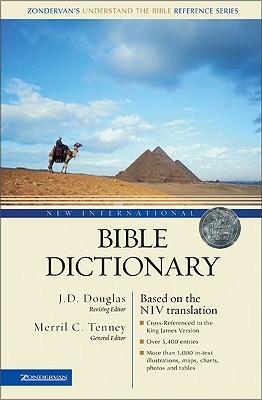- Bíblia
- Leia a Bíblia
- Versões da Bíblia
- Verso do dia
- Planos de Leitura
- Versos por Tópico
- Books of the Bible
- Imagens bíblicas
- Estude
- Comentários
- Concordâncias
- Dicionários
- Enciclopédias
- Sermões
- Bible Atlas & Maps
- BP Wiki
- Devocionais
- Devocionais de hoje
- Light of the World
- Todos os devocionais
- Inspirational Quotes
- Mais
- Picture Quotes
- Videos
- Inspirador
- Estudo da Bíblia
- O que a Bíblia diz
- Bible Q&As
- Daily Bread
- Bible by Genre
- Bible Stories
- Random Bible Verse
- Comunidade
- Store
New International Bible Dictionary: Based on the NIV
by F.F. Bruce
The New International Bible Dictionary delivers an encyclopedic wealth of insight into the historical, chronological, archaeological, geographical, social, theological, and biographical aspects of the Bible. Whether you're a general reader of the Bible, a pastor, or a student, this volume belongs in your library. It offers the following features: * Based completely on the NIV and cross-referenced to the King James Version. * Over 4,500 entries give you a broad understanding of people, places, events, and movements.* More than 1,000 in-text illustrations, maps, charts, photos, and tables lend clarity and visual impact.* 16 pages of indexed maps and 16 pages of photographs give you a feel for the land and culture.* Complete Scripture index helps you quickly link words and topics to related Bible verse.'Excellent . . . for conservative students and church libraries.'---CBA Marketplace'A massive, important work.'---The Biblical Evangelist'Highly recommended.'---The Reference Book Review'Contains a wealth of data . . . useful for serious Bible students as well as for those looking for quick answers to Bible-related questions.'---Church Media Library MagazineZondervan's Understand the Bible Reference SeriesThis six-volume series supplies users of today's most popular modern Bible translation, the New International Version, with scholarly, economical, and uncompromisingly evangelical study tools. It includes the New International Bible Commentary, New International Bible Dictionary, New International Bible Concordance, and New International Encyclopedia of Bible Words, New International Encyclopedia of Bible Difficulties, and the New International Encyclopedia of Bible Characters.
BUY NOW
Hardcover, 1200 pages
Published October 4th 1987 by Zondervan (first published September 27th 1987)
Se inscrever
© 2025 Bibleportal.com Todos os direitos reservados.

Frederick Fyvie Bruce was a Biblical scholar, and one of the founders of the modern evangelical understanding of the Bible. His work New Testament Documents: Are They Reliable? is considered a classic in the discipline of Christian apologetics.
Bruce was a distinguished scholar on the life and ministry of Paul the Apostle, and wrote several studies the best known of which is Paul: Apostle of the Heart Set Free. He also wrote commentaries on several biblical books including Romans, Acts of the Apostles, 1 and 2 Corinthians, The Gospel and Epistles of John, and the Epistle to the Hebrews.
He was honoured with two scholarly works by his colleagues and former students, one to mark his sixtieth and the other to mark his seventieth birthday. He was elected a Fellow of the British Academy, and served as President of the Society for Old Testament Study, and also as President of the Society for New Testament Study. He is one of a handful of scholars thus recognised by his peers in both fields.
... Show more